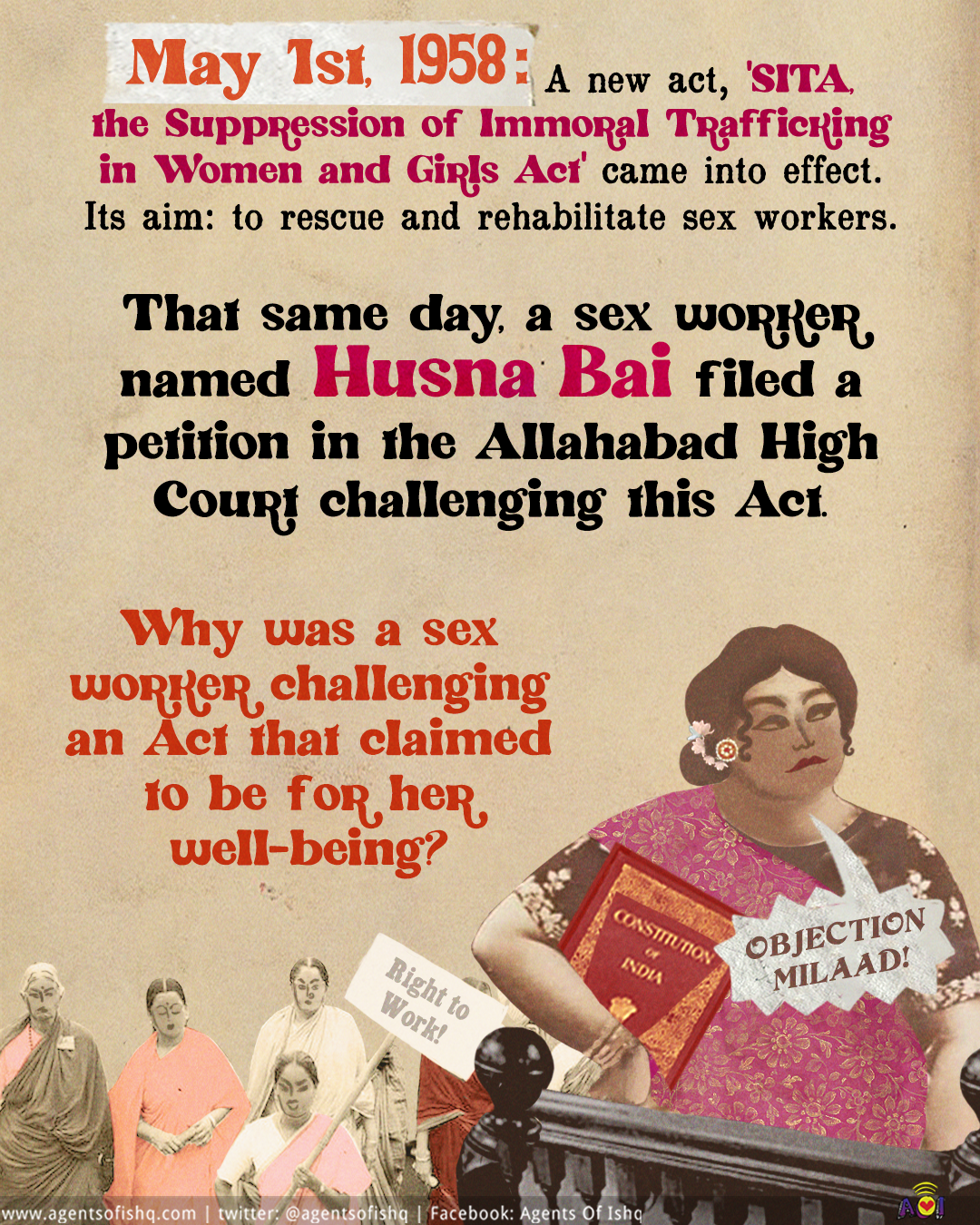
Text on the card reads:
May 1st, 1958: A new act, 'SITA the Suppression of Immoral Trafficking in Women and Girls Act' came into effect. Its aim: to rescue and rehabilitate sex workers.
That same day, a sex WORKER named Husna Bai filed a petition in the Allahabad High Court challenging this Act.
Why was a sex WORKER challenging an Act that claimed to be for her well-being?
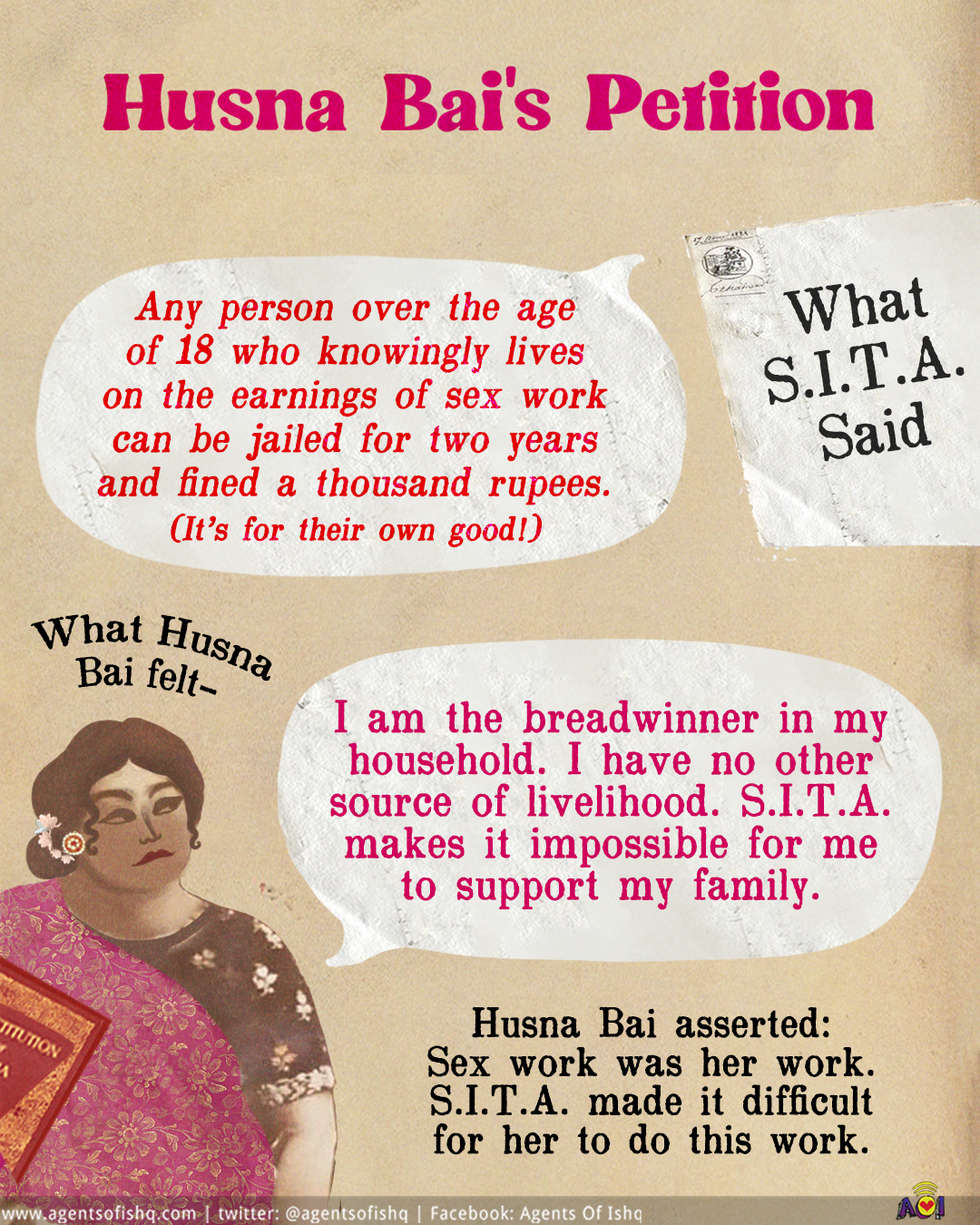
Text on the card reads:
Husna Bai's Petition
What S.I.T.A. Said "Any person over the age of 18 who knowingly lives on the earnings of sex work can be jailed for two years and fined a thousand rupees. (It's for their own good!)"
What Husna Bai felt-
I am the breadwinner in my household. I have no other source of livelihood. S.I.T.A. makes it impossible for me to support my family.
Husna Bai asserted: Sex work was her work. S.I.T.A. made it difficult for her to do this work.
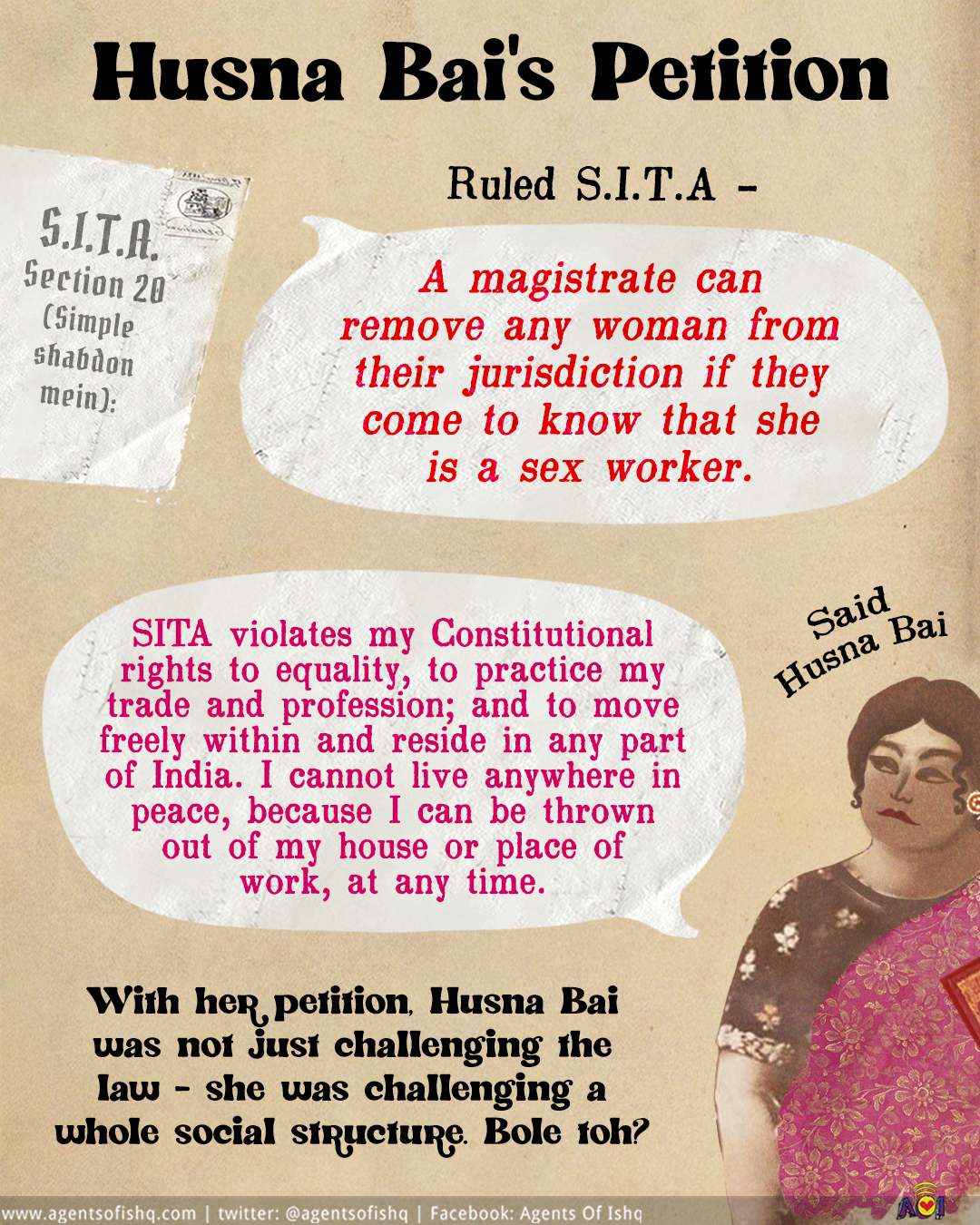
Text on the card reads:
Husna Bai's Petition
S.I.T.A. Section 20 (Simple shabdon mein):
Ruled S.I.T.Α - A magistrate can remove any woman from their jurisdiction if they come to know that she is a sex worker.
Husna Bai said: SITA violates my Constitutional rights to equality, to practice my trade and profession; and to move freely within and reside in any part of India. I cannot live anywhere in peace, because I can be thrown out of my house or place of work, at any time.
With her, petition. Husna Bai was not just challenging the law - she was challenging a whole social structure. Bole toh?
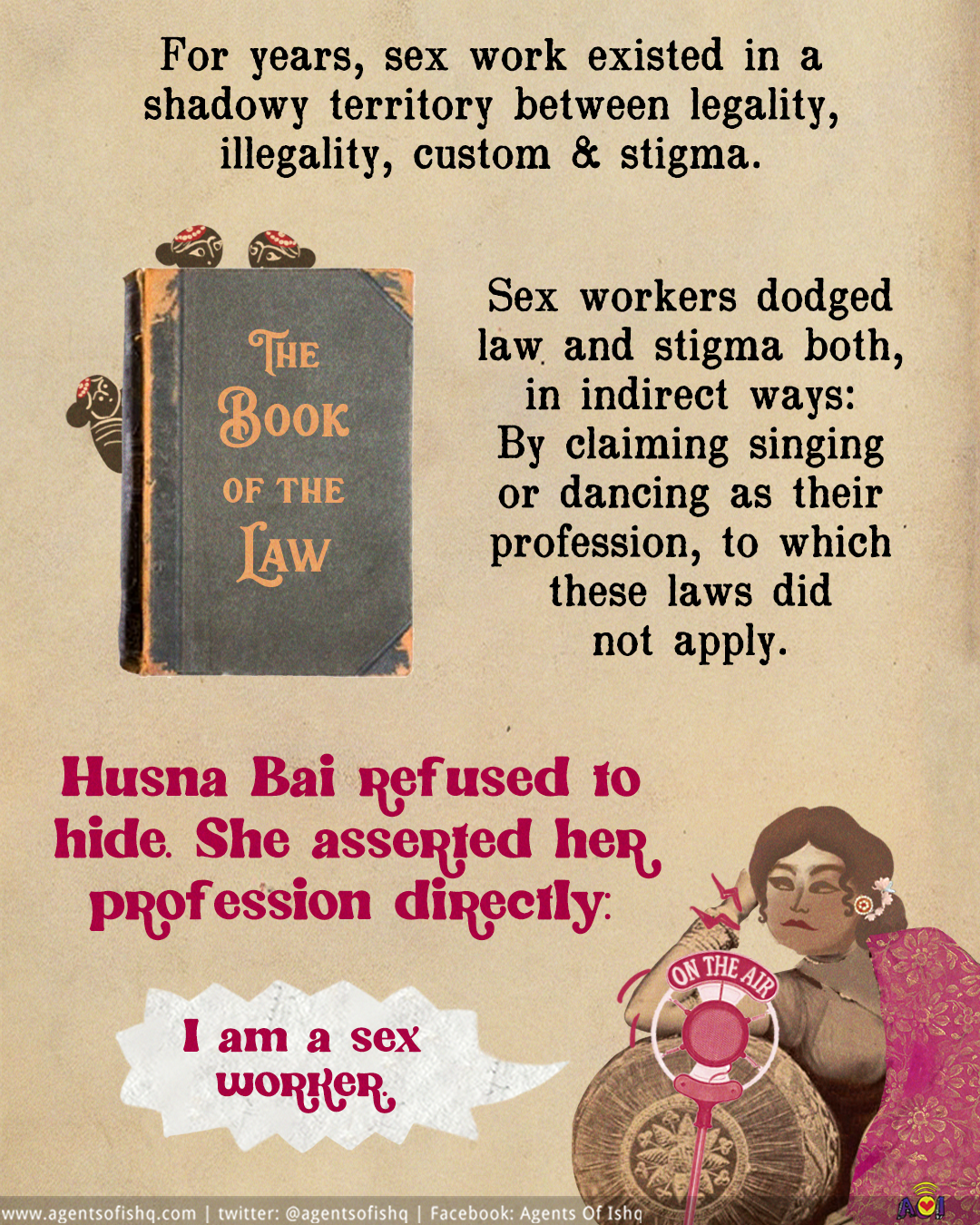
Text on the card reads:
For years, sex work existed in a shadowy territory between legality, illegality, custom & stigma.
Sex workers dodged law and stigma both, in indirect ways: By claiming singing or dancing as their profession, to which these laws did not apply.
Husna Bai Refused to hide. She asserted her profession directly:
“I am a sex worker”
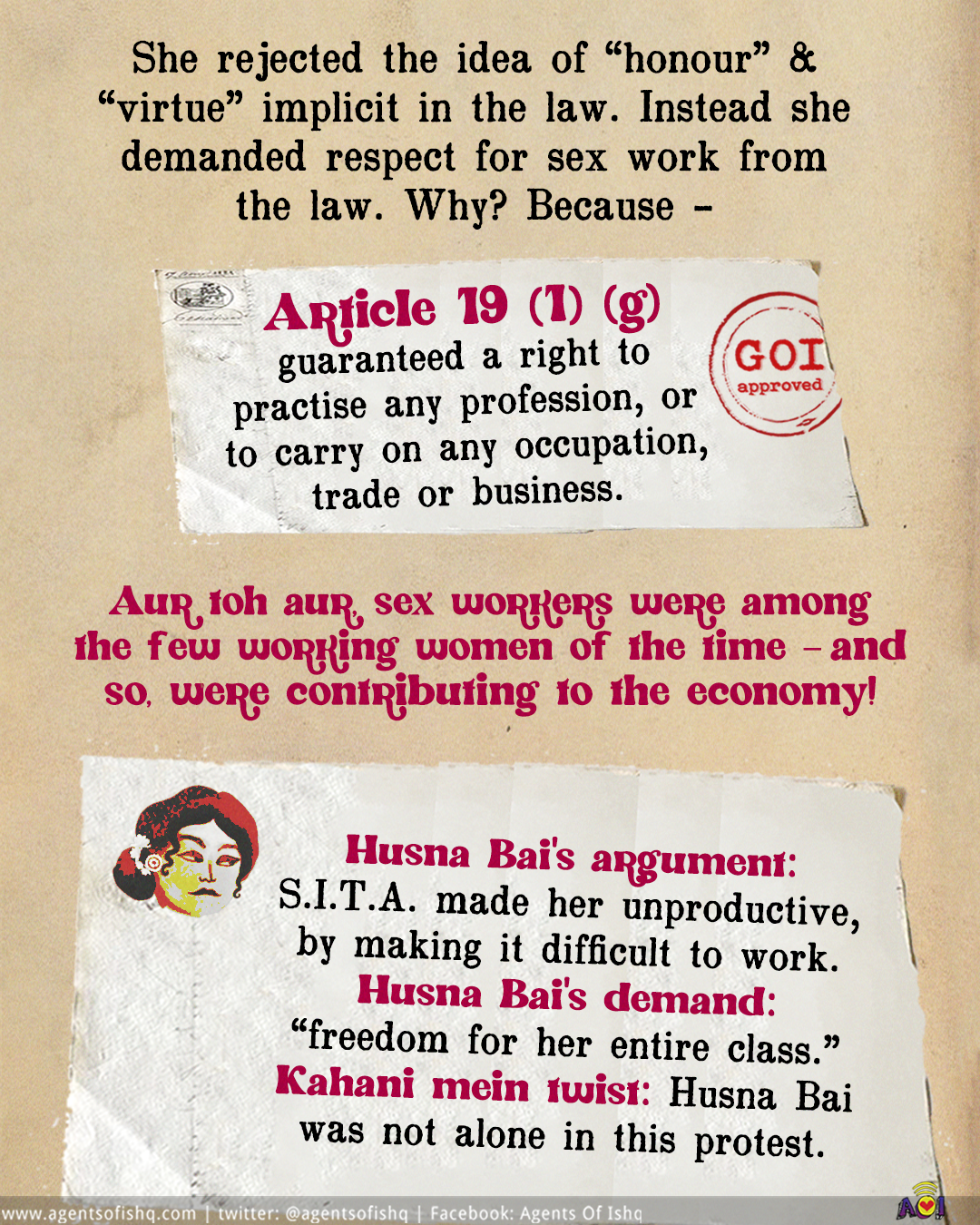
Text on the card reads:
She rejected the idea of "honour" & "virtue" implicit in the law. Instead she demanded respect for sex work from the law. Why? Because - Article 19 (1) (g) guaranteed a right to practise any profession, or to carry on any occupation, trade or business.
Aur, toh aur sex workers were among the few working women of the time - and So, were contributing to the economy!
Husna Bai's argument: S.I.T.A. made her unproductive, by making it difficult to work.
Husna Bai's demand: "freedom for her entire class." Kahani mein twist: Husna Bai was not alone in this protest.
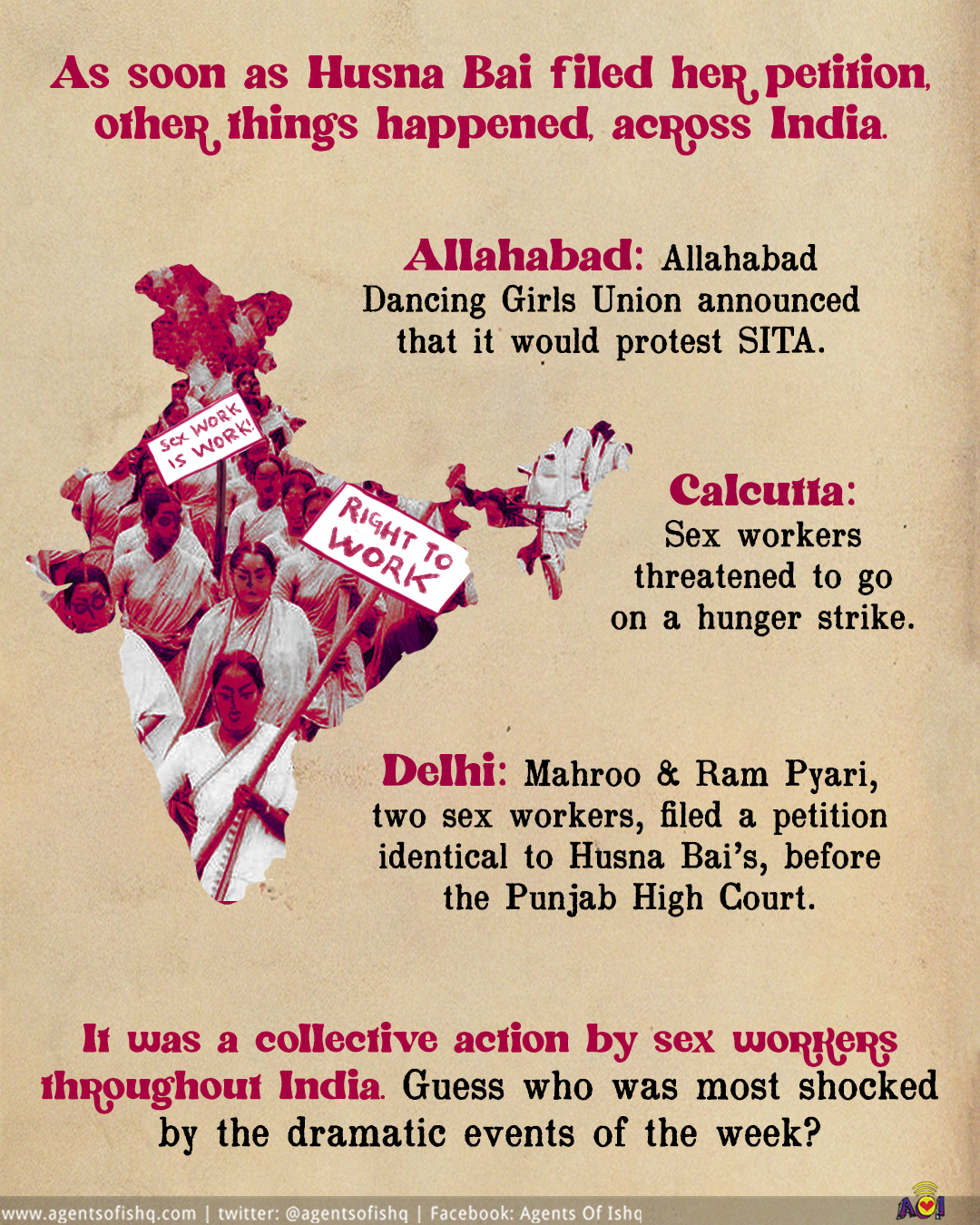
Text on the card reads:
As soon as Husna Bai filed her, petition, other thing's happened across India.
Allahabad: Allahabad Dancing Girls Union announced that it would protest SITA.
Calcutta: Sex workers threatened to go on a hunger strike.
Delhi: Mahroo & Ram Pyari, two sex workers, filed a petition identical to Husna Bai's, before the Punjab High Court.
It was a collective action by sex workers throughout India. Guess who was most shocked by the dramatic events of the week?
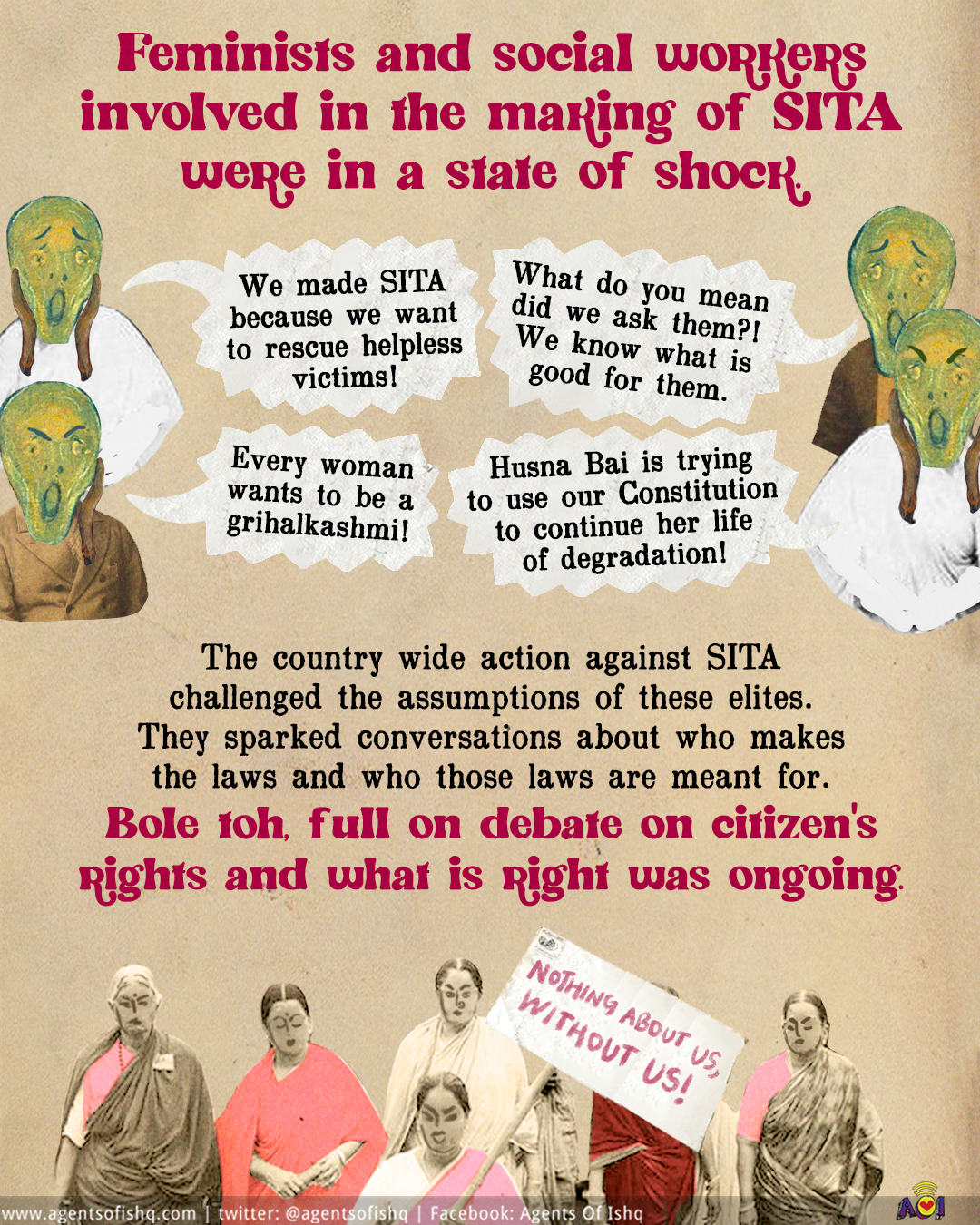
Text on the card reads:
Feminists and social WORKERS involved in the making of SITA were in a state of shock
“We made SITA because we want to rescue helpless victims!”
“What do you mean did we ask them?! We know what is good for them.”
“Every woman wants to be a grihalkashmi!”
“Husna Bai is trying to use our Constitution to continue her life of degradation!”
The country wide action against SITA challenged the assumptions of these elites. They sparked conversations about who makes the laws and who those laws are meant for.
Bole toh, full on debate on citizen's Rights and what is Right was ongoing.
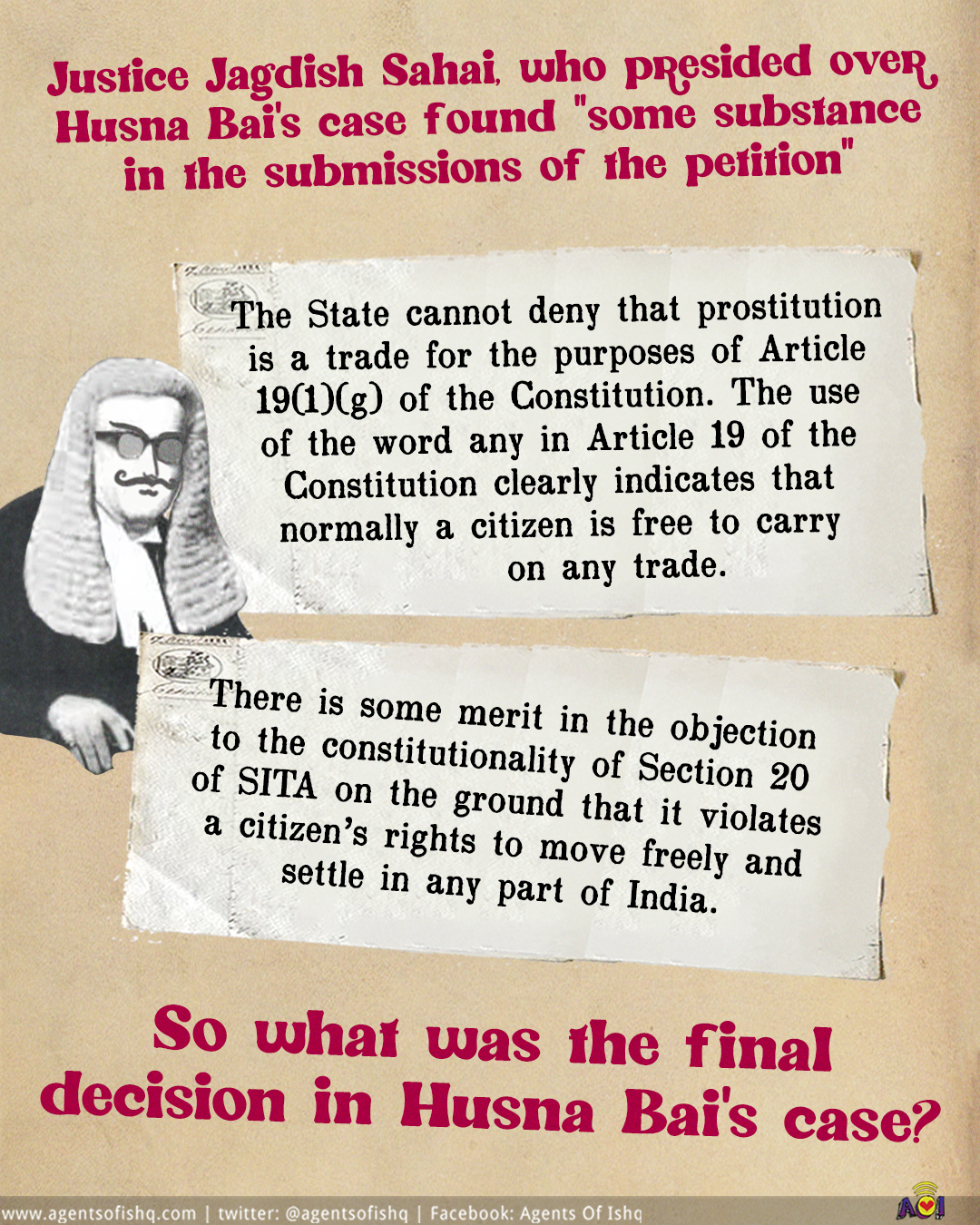
Text on the card reads:
Justice Jagdish Sahai, who presided over Husna Bai's case found "some substance in the submissions of the petition"
The State cannot deny that prostitution is a trade for the purposes of Article 19(1)(g) of the Constitution. The use of the word any in Article 19 of the Constitution clearly indicates that normally a citizen is free to carry on any trade.
There is some merit in the objection to the constitutionality of Section 20 of SITA on the ground that it violates a citizen's rights to move freely and settle in any part of India.
So what was the final decision in Husna Bai's case?
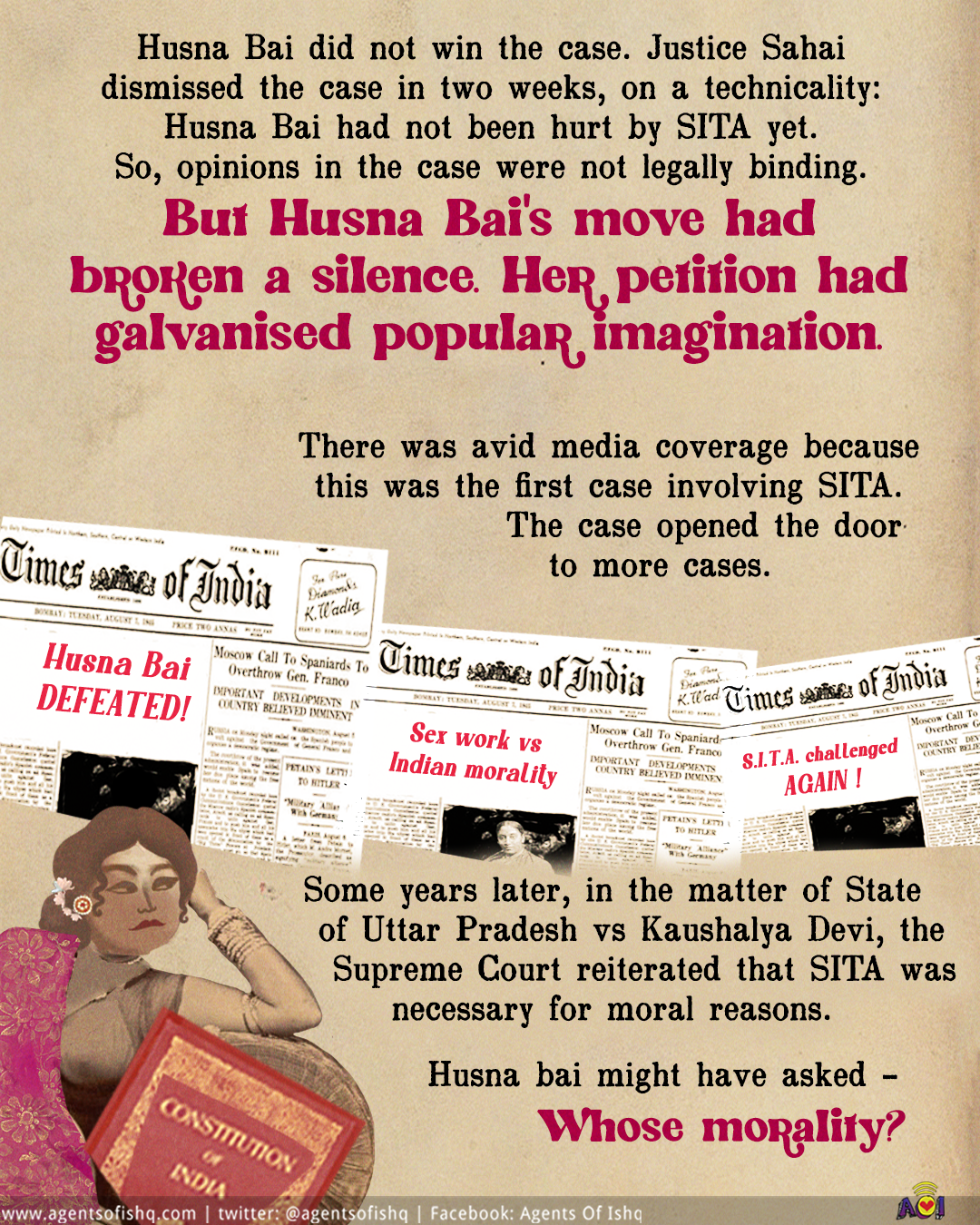
Text on the card reads:
Husna Bai did not win the case. Justice Sahai dismissed the case in two weeks, on a technicality: Husna Bai had not been hurt by SITA yet. So, opinions in the case were not legally binding.
But Husna Bai's move had broken a silence. Her petition had galvanised popular, imagination.
There was avid media coverage because this was the first case involving SITA. The case opened the door to more cases.
Some years later, in the matter of State of Uttar Pradesh vs Kaushalya Devi, the Supreme Court reiterated that SITA was necessary for moral reasons.
Husna bai might have asked: Whose morality?
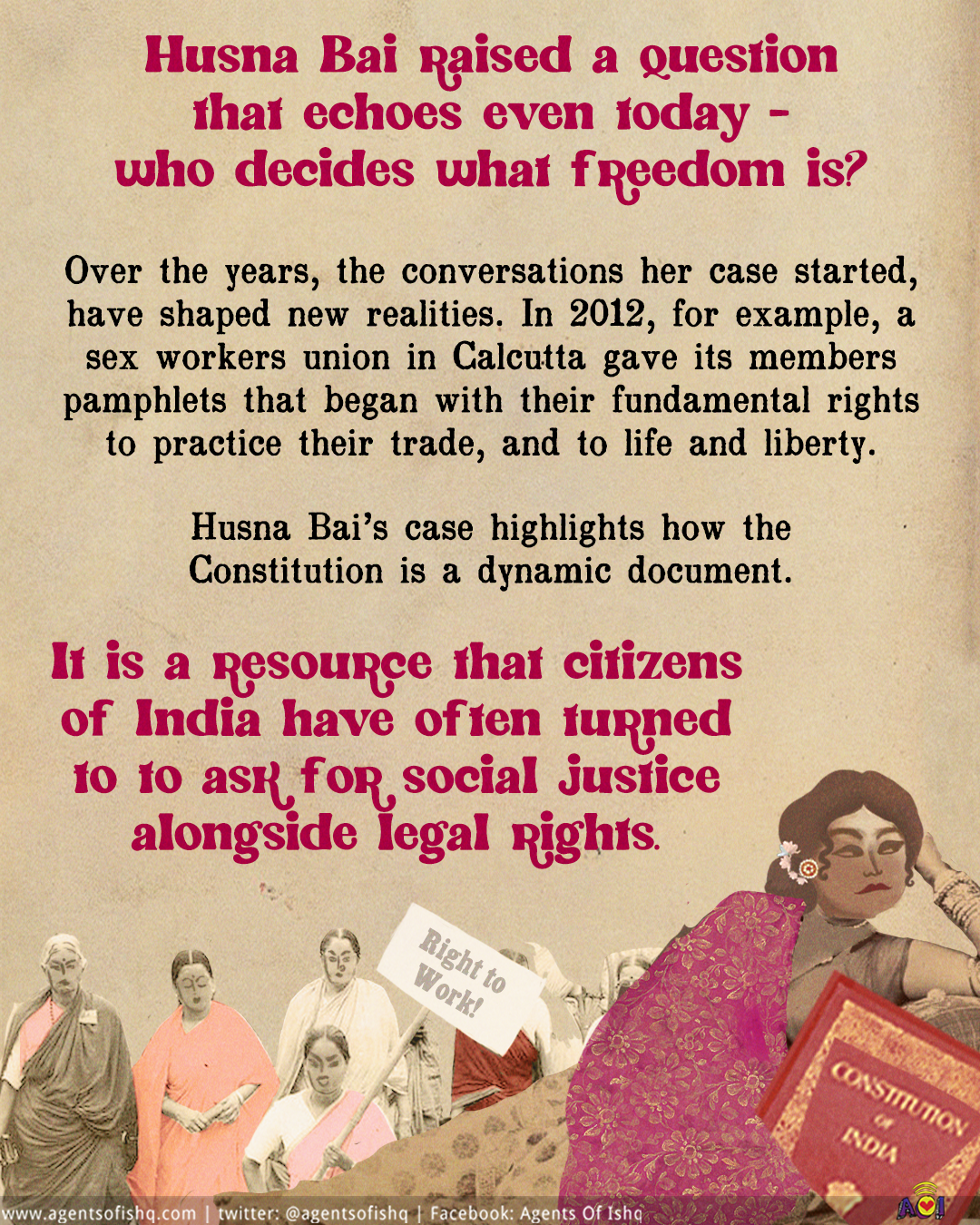
Text on the card reads:
Husna Bai Raised a question that echoes even today - who decides what freedom is?
Over the years, the conversations her case started, have shaped new realities. In 2012, for example, a sex workers union in Calcutta gave its members pamphlets that began with their fundamental rights to practice their trade, and to life and liberty.
Husna Bai's case highlights how the Constitution is a dynamic document.
It is a resource that citizens of India have often turned to to ask for social justice alongside legal Rights.
Our source: A People’s Constitution: The Everyday Life of Law in the Indian Republic , by Rohit De.

































































































































































































































































































































































































































































































































































































































































































































































































































































































































































































































































































































































































































